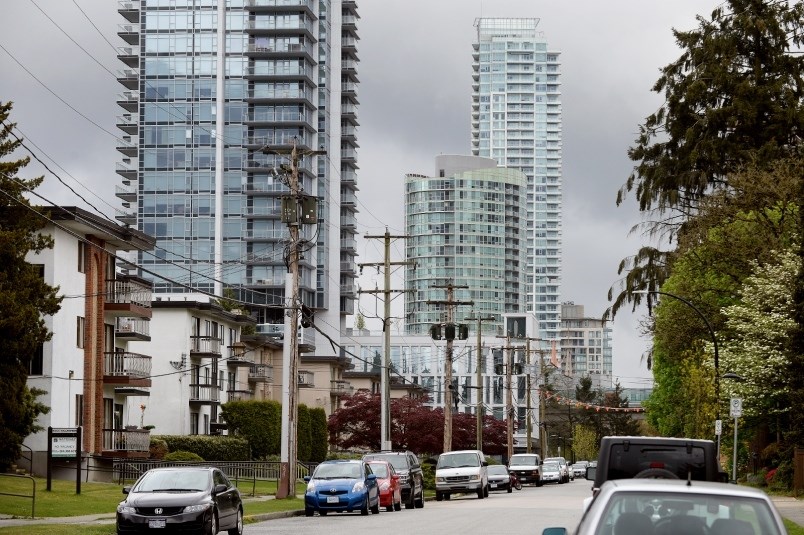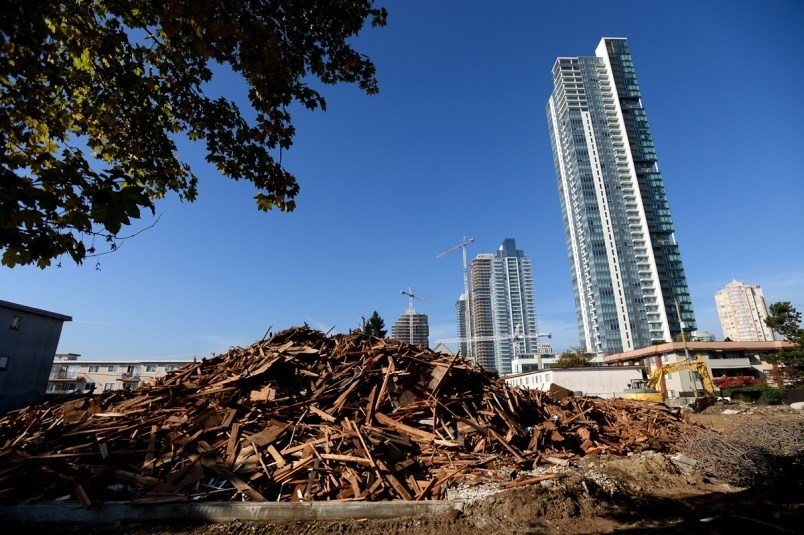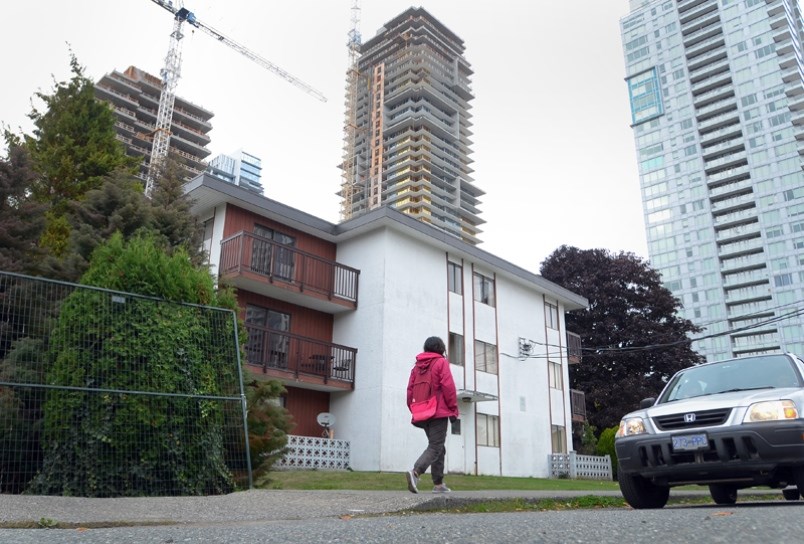Hundreds of rental apartments have been demolished in Burnaby in recent years, while few new ones have been built.
Now, the city has passed an ambitious plan to turn the tide.
On Monday, city council voted ananimously to endorse an implementation strategy for rental-only zoning. The plan aims to protect thousands of existing rental apartments from demolition and could lead to thousands more being built, Mayor Mike Hurley said.
Between Jan. 1, 2011 and April 30, 2019, there were 685 purpose-built rental units demolished in Burnaby’s Metrotown neighbourhood alone, according the city. The dramatic loss in rental stock was largely the result of developers razing low-rise apartment building to make way for new condo towers.
Thousands of renters were displaced in the process.
“It’s time to start turning that trend around,” Hurley said.
Burnaby was the first B.C. municipality to take advantage of new rental-only zoning powers, adding a suite of new zoning classifications to its bylaws in December 2018. While other cities have since used rental zoning in limited instances, Burnaby city staff have been developing an all-encompassing plan for implementation.
“I think there's other municipalities that have touched on individual points, but never as a package like this that comprises the whole gamut,” Burnaby’s assistant director of current planning, Johannes Schumann told the NOW.
One-to-one rental replacement
The plan requires developers to replace every rental apartment they demolish in a redevelopment on a one-to-one basis.
And those replacement apartments would have to be rented out at affordable rates, defined as 20-per-cent below the rental market average determined by the Canada Mortgage and Housing Corporation. In 2018, CMHC found the average rents for one-bedroom apartments were $1,253 in Burnaby’s Central Park/Metrotown neighbourhood, $1,094 in southeast Burnaby and $1,329 in North Burnaby.

The CMHC average takes into account all rentals in an area, meaning the rates are far lower than typical rents for new builds, Schumann said. He estimates the prescribed rates for replacement apartments will be 40-per-cent below typical market rates for new purpose-built rental units.
“This is really just laying down the gauntlet,” Schumann said. “You gotta replace one to one - it’s gotta be affordable.”
Displaced tenants would also be given the opportunity to move into the new apartments once they’re complete.
The Mayor’s Task Force on Community Housing is currently finalizing its tenant relocation policy recommendations, Hurley said. He said the plan will ensure fair treatment and compensation for displaced renters.
Rental units in new builds
City staff are also recommending council endorse a plan that would require 20 per cent of units in all new multi-family developments to be purpose-built rentals. The city would be able to protect those units as rentals in perpetuity by applying rental-zoning to specific units, while the rest of the building would fall under different zoning for stratified units.
Adding rentals to commercial zones
Developers building in commercial zones could add rental units to their buildings, as long as the overall building conforms to community plans for the area, Schumann said.
For example, if a developer plans to build a 10-storey office tower in an area where city plans call for a maximum of 20 storeys, they could add 10 storeys of rental housing, Schumann said. Only 51 per cent of the total floor area would have to be for commercial use.
More condos offsetting affordable rentals
A new “density offset” policy could allow developers to build more market condos in a building if they also create “affordable” rental units. The city would use the same definition of affordable as the rental units replacing demolished apartments (20 per cent below CMHC average).
The affordable rents could be owned and managed by the building's strata or by a non-profit, Schumann said.
Vacancy rental controls
While this plan could lead to hundreds or thousands of new rental units being built in Burnaby in the coming years, there’s no guarantee they’ll be affordable to the average person. Developers will be able to set the initial rents at the market rate, but the city plans to put controls on subsequent increases.
Staff are recommending the city require covenants that would restrict rental increases when tenants turn over – a policy known as vacancy control. The owner would only be able to increase the rent for new tenants by the maximum annual increase for incumbent renters set out by the province that year (2019’s maximum increase is 2.5 per cent).
The vacancy controls would only apply to purpose-built rental units built after the policy is in place. The city has no legal mechanism to control rental increases in existing rentals, Schumann explained.

Developers often cry foul when rent controls are proposed, saying the policy hurts their ability to cover maintenance costs. But Hurley said he believes new buildings will continue to be proposed and built.
“Developers will always say it hurts their business case, but I don't necessarily believe that,” he said. “The profits may not be as high as they were before, but they'll still be there.”
Protecting existing rentals
Even if the city moves ahead with the above proposals, existing rental units could still be threatened by redevelopment.
A developer could demolish a purpose built rental building and replace it with market condos under the existing zoning. Without a rezoning process, the city would have no ability to require replacement rental units.
So the city’s plan proposes rezoning all existing purpose-built rental buildings with six or more units as rental only. Schumann estimate this would be a mass rezoning of some 500 to 1,000 units throughout the city.
If the plan is endorsed, council will have to go through the typical rezoning process to rezone the rental sites, which includes public hearings.
The right balance?
The overall plan finds a balance that will actually see rental units built and protected, Schumann said.
“We feel that we've hit the mark,” he said. “We want to achieve these units. The goal is to actually see them built, not just have a good policies sitting on a shelf.”
The plan is now official city policy.
“In terms of implementation, it's a mixture of the tortoise and the hare,” he said. “I think we want to come out of the gate strong, providing these opportunities but we understand that this is long-term goal for the city, this isn't a flash in the pan.”
Hurley, who was elected in 2018 on a promise to improve housing affordability, said the rental zoning will be just one “tool in the toolbox” for the city going forward.
“I don’t feel it’s a panacea; I feel it’s an opportunity,” he said.
Hurley’s housing task force recently released an interim report with 10 “quick start” recommendations and is expected to deliver a final report this summer.



